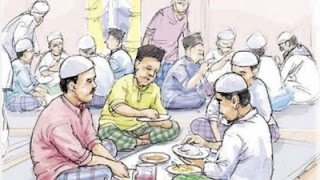Legal Basis of Haul and its Contents
Haul is an Arabic word which means one year. This term is often discussed in the explanation of the obligation of Zakat. In addition, the term haul is familiarly heard among the Nahdlatul Ulama community as a joint prayer activity that is carried out every year after someone dies. There are a few people who question the Legal Basis of Haul, suddenly a few say that this behavior is not in accordance with the sunnah of the Prophet Muhammad SAW and the like.
Haul in the KBBI is defined as a commemoration of the day of someone's death which is held once a year and is usually accompanied by a celebration for the soul. Commemorating the haul of ulama and kiai who have contributed greatly to the development of Islam is a very common thing for Muslims in Indonesia to do. Commemorating the haul is done by holding joint prayers and religious lectures by inviting qualified lecturers.
Legal Basis of Haul of the Dead
This haul commemoration is based on the hadith of the Prophet Muhammad as explained in the book of Syarah Al-Ihya juz 10 in the chapter on the grave pilgrimage. Prophet Muhammad SAW always made a pilgrimage to the tomb of the martyrs on the hill of Uhud every year. Then when he got there he said a prayer as stated in the Qur'an Surah Ar-Ra'd verse 24:
سَلاَمٌ عَلَيْكُم بِمَا صَبَرْتُمْ فَنِعْمَ عُقْبَى الدَّارِ
Meaning: "Salvation be upon you thanks to your patience. So what a good place to end it."
This event is then used as the basis of Islamic law for the implementation of the commemoration of the haul or an annual event to pray and remember our kiai, scholars, elders and parents.
In addition, it is also narrated that the companions of the Prophet also did what the Prophet SAW had done. The following is a complete quote from the hadith narrated by Imam al-Baihaqi,
وَ رَوَى الْبَيْهَقِي فِي الشَّعْبِ، عَنِ الْوَاقِدِي، قَالَ: كَانَ النَّبِيُّ صَلَّى الله عَلَيْهِ وَ سَلَّمَ يَزُوْرُ الشُّهَدَاءَ بِأُحُدٍ فِي كُلِّ حَوْلٍ. وَ إذَا بَلَغَ رَفَعَ صَوْتَهُ فَيَقُوْلُ: سَلاَمٌ عَلَيْكُم بِمَا صَبَرْتُمْ فَنِعْمَ عُقْبَى الدَّار
Meaning: "Al-Baihaqi narrated from al-Wakidi regarding death, that the Prophet SAW always made a pilgrimage to the graves of the martyrs on Mount Uhud every year. And when he got there he said greetings by raising his voice, "Salamun alaikum bima shabartum fani'ma uqbad daar "-Surah Ar-Ra'd: 24- Salvation be upon you thanks to your patience. So what a good place to end it."
Continuation of history explained,
ثُمَّ أبُوْ بَكْرٍ كُلَّ حَوْلٍ يَفْعَلُ مِثْلَ ذَلِكَ، ثُمَّ عُمَرُ ثُمَّ عُثْمَانُ. وَ كاَنَتْ فَاطِمَةُ رَضِيَ اللهُ عَنْهَا تَأتِيْهِ وَ تَدْعُوْ. وَ كاَنَ سَعْدُ ابْنِ أبِي وَقَّاصٍ يُسَلِّمُ عَلَيْهِمْ ثُمَّ يَقْبَلُ عَلَى أصْحَابِهِ، فَيَقُوْلُ ألاَ تُسَلِّمُوْنَ عَلَى قَوْمٍ يَرُدُّوْنَ عَلَيْكُمْ بِالسَّلَامِ
Meaning: "Abu Bakr also did this every year, then Umar, then Uthman. Fatimah also made a pilgrimage to the hill of Uhud and prayed. Saad bin Abi Waqqash greeted the martyrs then he turned to his friends and said, "Why do you do not greet those who will answer your greetings?”
Similar explanations are found in the book of Najhul Balaghah and the Book of Manaqib As-Sayyidis Syuhada Hamzah RA by Sayyid Ja'far Al-Barzanji which explains that the hadith is a legal basis for the people of Medina for those who perform the Rajabiyah Pilgrimage (annual pilgrimage every Rajab month) to So Sayidina Hamzah, which was a tradition by the family of Sheikh Junaid al-Masra'i because this had a dream with Hamzah who told him to make the pilgrimage.
Payload Warning Haul
In the haul warning there are three charges that cannot be separated, namely: tahlilan, recitation, and alms. The legal status of these three things, by itself also affects the determination of the haul law.
Tahlilan
The majority of scholars from the four schools of thought as explained by Sheikh KH Ali Ma'sum in his book, Hujjah Ahlus Sunnah wal Jam'ah are of the opinion that the reward for worship or pious deeds performed by people who are still alive can reach the dead. Understanding or good deeds here are general, including reading the Qur'an, dhikr, alms and others. Praying is also useful for him. Praying for someone who has died is different from praying to him.
Study
Recitation is one of the oral bil da'wah (by speech). The aim is to provide insight, guidance and counseling in an effort to improve the quality of the piety of the Muslims, by expanding their understanding of the teachings of their religion. In several haul commemorations, this recitation is filled with reading narrations from scholars who are being hauled.
Alms
Alms whose reward is given to the deceased are basically permissible. Because it includes good deeds, as mentioned above. From this information, it is clear that activities in a series of haul ceremonies are justified. So by itself haul itself is not prohibited.

Post a Comment for "Legal Basis of Haul and its Contents"